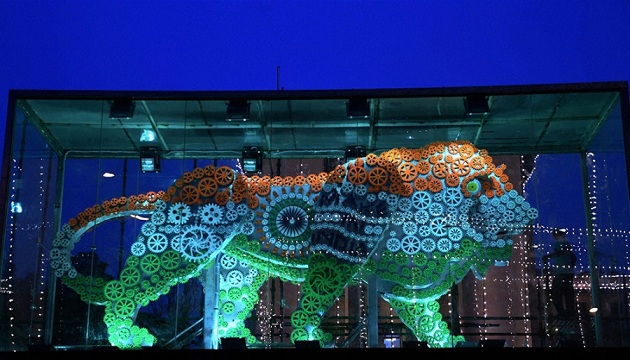
Source: Eletimes
Manufacturing sector has always been an interesting field for Mechanical Engineers since ages. Having completed almost 16 yrs working for some great manufacturing companies, I have understood lots of intricacies of this sector. Recently, Manufacturing has emerged as one of the highest growth sectors in India. This sector has got additional thrust after Mr. Narendra Modi had launched the “Make in India” program. I am finding myself fortunate enough to be working for one such great project starting from scratch (also called Green Field Project).
What is Manufacturing:- Manufacturing is the production of Products for use or sell using Man, Material, Machine, & Method (called 4 Ms). Manufacturing Process is one of the pivotal aspects for manufacturing. Manufacturing process are the steps through which raw materials are transformed into final product.
When a manufacturing company begins production of a product, it has a choice as to the manufacturing process it uses. The type of process depends on the facility, the staff, and the information systems available. Each process has its advantages and some are best at certain tasks, for example, large batches of finished goods, or small numbers of custom items (also called Niche Products). When the decision is being considered about which manufacturing process to use, there are a number of questions that should be asked; what are the volumes to be produced, what are the requirements to make the product, and does the company manufacture a similar product?
There are a number of basic manufacturing processes that they can select from; production line, continuous flow, custom manufacturing, and fixed position manufacturing.
Types of Manufacturing Processes: Following are the 4 main types of manufacturing processes.
- Machining
- Joining
- Forming
- Casting
Manufacturing Sector: India is expected to become the fifth largest manufacturing country in the world by the end of year 2020. Government aims to achieve 25 % GDP share and 100 million new jobs in this sector by 2022. India has become one of the most attractive destinations for investments in the manufacturing sector. Under Make in India drive, India is on the path of becoming hub for hi-tech manufacturing as global giants such as GE, Alstom, Siemens, HTC, Toshiba, and Boeing have either set up or are in process of setting up manufacturing plants in India, attracted by India’s market of more than a billion consumers and increasing purchasing power.
Some Tools to be used in Manufacturing:- Great companies across the world uses following Tools to minimize their waste during Manufacturing operation:-
(a) Lean – Helps to eliminate waste from the Processes. “TIMWOODN” (Transportation, Inventory, Motion, Waiting, Over Production, Over Processing, Defects & Non Utilized talents) are called as waste in manufacturing.
(b) Six Sigma – Mathematical Tool used for solving complex problems
(c ) 5S – Stands for Sort, Shine, Set in order, Shine & Sustain
(d) TPM – Total Productive Maintenance, is a maintenance program which involves a newly defined concept for maintaining plants and equipment.
(e) Kaizen – Kai (Change) + Zen (Good), A Japanese word, Used for continuous improvement.
(f ) Value Engineering – For increasing value to customer (either by reducing cost or by increasing value- keeping the cost same)
(g) 3P- An acronym for Production Preparation Process, which is a method that focuses on eliminating waste through product and process design
Who can/should Choose Manufacturing (Or Qualification for Manufacturing?) Any technical degree or some good skill is the basic need for entering into manufacturing field. A career in manufacturing can be pursued with a high school diploma or Graduate Engineer diploma. Experience using tools is typically required, and those who enter this field will have to complete workplace safety courses and other training through their employer. Manufacturing industry is a diversified field that includes jobs ranging from production workers to purchasing agents. The top two occupations in manufacturing are team assemblers and machinists. The third most populous occupation, which may be thought of as quality control employees, includes inspectors, testers, sorters, samplers and weighers.
Some great companies to work in India
There are thousands of manufacturing companies in India. Following are few names along with the industry:-
| Organization | Industry |
| Apollo Tyres Ltd. | Automotive & Auto Components |
| CEAT Ltd. | Automotive & Auto Components |
| Forbes Marshall Pvt. Ltd. | Manufacturing & Production |
| Gabriel India Ltd. | Automotive & Auto Components |
| GHCL Ltd. | Chemicals |
| Gilard Electronic Pvt. Ltd. | Automotive & Auto Components |
| Godfrey Phillips India Ltd. | Food products / Tobacco |
| Godrej Consumer Products Ltd. | Fast Moving Consumer Goods |
| Hafele India Pvt. Ltd. | Furniture |
| HIL Ltd. | Building Materials |
| Hygienic Research Institute Pvt. Ltd. | Fast Moving Consumer Goods |
| Indian Oil Corporation Ltd. | Coke, refined petroleum products and nuclear fuel |
| Ingersoll – Rand Technologies and Services Pvt. Ltd. | Machinery and equipment |
| JK Paper Ltd. | Pulp, paper and paper products |
| JK Tyre & Industries Ltd. | Automotive & Auto Components |
| Mahindra & Mahindra Automotive & Farm Equipment Sectors | Automotive & Auto Components |
| Mahle Anand Filter Systems Pvt. Ltd. | Automotive & Auto Components |
| Mars International India Pvt. Ltd. | Fast Moving Consumer Goods |
| NTPC Ltd. | Energy production |
| Parksons Packaging Ltd. | Manufacturing & Production |
| Piramal Glass Pvt. Ltd. | Manufacturing & Production |
| S.C. Johnson Products Pvt. Ltd. | Fast Moving Consumer Goods |
| Tata Motors Ltd | Automotive |
| Signify Innovations India Ltd. | Alternative Energy |
| Spicer India Pvt. Ltd. | Automotive & Auto Components |
| Tata Steel India Ltd. | Basic metals and fabricated metal products |
| VIP Industries Ltd. | Manufacturing & Production |
| Whirlpool of India Ltd. | Fast Moving Consumer Goods |
Challenges in Manufacturing
Though the manufacturing industry is quite lucrative. It has certain challenges as well. Last few years, it has been observed that the industry is following sinusoidal wave. tEvery 3-5, industry recession is observed. There are multiple reasons for this behavior. Majority of manufacturing companies worldwide are facing following challenges:-
- Skilled Labor – The manufacturing skills gap could potentially leave an estimated 2.4 million positions unfilled between 2018 and 2028 with a potential economic impact of $2.67T.
- Global Competition – The rise of the internet as a way of doing business has naturally increased the number of outlets a manufacturer can utilize to take their products to market.
- Regulation and Compliance – Although highlighted by recent GDPR regulations affecting how manufacturers promote their goods, the sector has always faced increasing regulation and compliance measures. From health and safety to waste management, it’s a massive burden to manufacturing companies.
- Automation – Excess of automation in the process is causing lot of uncertainties.
 Author Bio: Santosh Kumar, Patna, is an expert in the field of Manufacturing Engineering. He is currently working as Lead Manufacturing Specialist, GE Transportation, a Wabtec Company and Ex-DGM-Tata Motors Ltd. He has successfully completed many challenging engineering projects with his superb managerial skills and technical knowledge.
Author Bio: Santosh Kumar, Patna, is an expert in the field of Manufacturing Engineering. He is currently working as Lead Manufacturing Specialist, GE Transportation, a Wabtec Company and Ex-DGM-Tata Motors Ltd. He has successfully completed many challenging engineering projects with his superb managerial skills and technical knowledge.
Write and Win: Participate in Creative writing Contest & International Essay Contest and win fabulous prizes.


